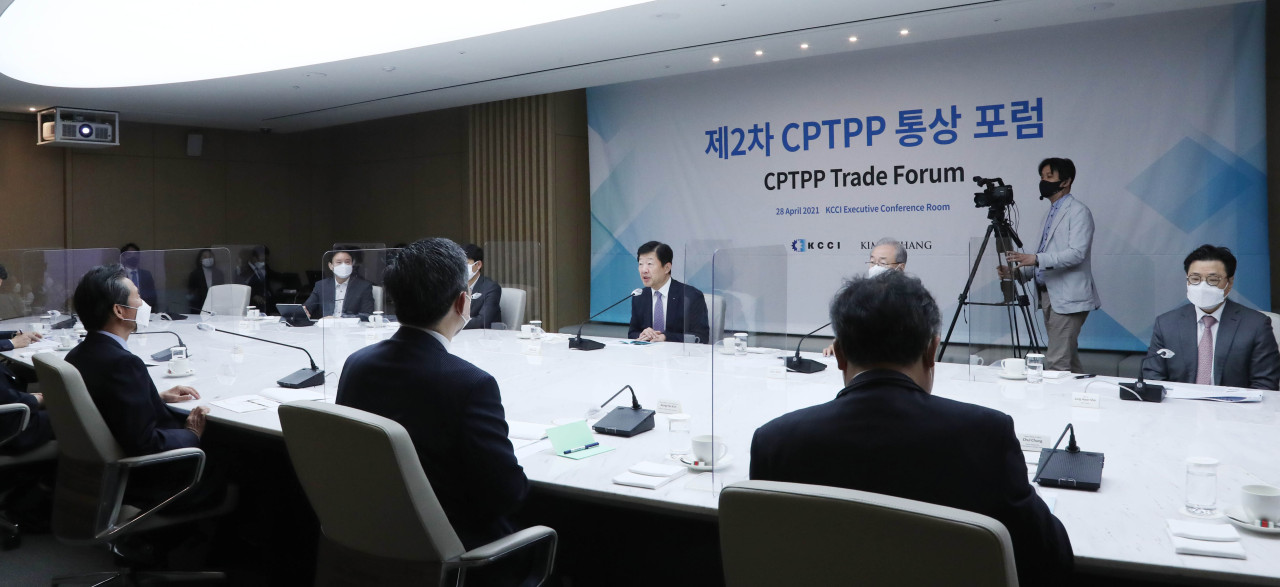‘US-China conflict may accelerate US membership in trans-Pacific trade pact’
By Bae HyunjungPublished : April 28, 2021 - 15:45

The United States, which under former President Donald Trump ditched talks toward a trans-Pacific trade order, may now be moving to rejoin the club, mostly due to the continuing conflict with China, market observers said Wednesday.
Their remarks came during the second CPTPP Trade Forum, organized jointly by the Korea Chamber of Commerce and Industry and the nation’s largest law firm, Kim & Chang. CPTPP stands for the Comprehensive and Progressive Agreement for Trans-Pacific Partnership.
The event was held to assess the outlook for US trade policies and to establish South Korea’s accession strategies, focusing on whether Korea is ready to adapt to the enhanced obligations and new trade rules within the CPTPP order.
Participants included KCCI Executive Vice Chairman Woo Tae-hee; senior adviser Lee Jae-hoon and foreign attorney Shin Jung-hoon of Kim & Chang; FTA Negotiations Director-General Kim Jung-hoi of the Ministry of Trade, Industry and Energy; and senior researcher Kim Bau of the Korea Institute for Industrial Economics and Trade.
Jeffrey Schott, senior fellow at the US Peterson Institute for International Economics, joined online from Washington, presenting an outlook on the Joe Biden administration’s trade policies and suggesting possible strategies for Korea regarding CPTPP membership.
“It is preferable that Korea joins the CPTPP swiftly as it will be able to secure first mover benefits ahead of clinching the Korea-China-Japan free trade deal in the future,” he said.
“The obligations of the CPTPP are similar to the Korea-US FTA and Korea already has bilateral FTAs with most of the CPTPP members,” he added, saying Asia’s fourth-largest economy need not hesitate to participate.
As for the Biden government, Schott predicted that the US would focus on domestic challenges for a while, but might quickly turn toward strengthening economic ties with its allies in the Asia-Pacific region should the US-China friction become protracted.
Shin of Kim & Chang mentioned a chapter in the pact dealing with state-owned enterprises, pointing out that Korea had 350 state-owned enterprises and would thus see a visible impact.
“In the CPTPP, the text of the agreement is no longer subject to negotiations and new members must simply accept the existing terms,” Shin said, calling for a thorough review before any membership decision.
The free trade deal took effect Dec. 30, 2018, and has 11 signatories: Japan, Australia, New Zealand, Canada, Mexico, Peru, Chile, Singapore, Malaysia, Vietnam and Brunei.
It is a renewed version of the older TPP, or Trans-Pacific Partnership, from which the United States withdrew in January 2017. The remaining 11 member states agreed to continue the initiative and signed a revised version renamed the CPTPP.
KCCI Vice Chairman Woo, who presided over the forum, said Korea needs to look more closely into new trade norms regarding state-owned enterprises, the environment and intellectual property rights to determine how the terms of the pact might affect the country’s industries.
By Bae Hyun-jung (tellme@heraldcorp.com)








![[Hello India] Hyundai Motor vows to boost 'clean mobility' in India](http://res.heraldm.com/phpwas/restmb_idxmake.php?idx=644&simg=/content/image/2024/04/25/20240425050672_0.jpg&u=)









